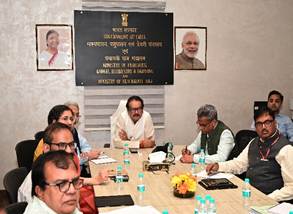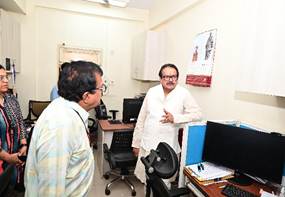
Minister Leads Hands-On Review of Cleanliness Efforts
The Department of Animal Husbandry and Dairying continues to make strong progress in its cleanliness initiatives through the ongoing Special Campaign 5.0. Union Minister of State Prof. S. P. Singh Baghel personally visited the department office located at Krishi Bhawan in New Delhi to check the ground-level implementation. He expressed satisfaction with the visible improvements in hygiene standards and the overall dedication shown by the staff.
Prof. Baghel, who handles portfolios in fisheries, animal husbandry, dairying, and panchayati raj, spent time walking through various sections of the office. His visit highlighted the practical steps taken to keep workspaces tidy and functional. Team members shared how daily routines now include quick checks to ensure no clutter builds up, creating a better environment for everyone.
Such direct involvement from a senior leader motivates employees and sets a clear example across government offices. It shows that maintaining clean surroundings is not just a one-time activity but a continuous responsibility that benefits productivity and morale.
Key Meeting Highlights Achievements and Future Plans
Following the inspection, Prof. Baghel held a detailed review session with top officials. Secretary Shri Naresh Pal Gangwar led the discussions, joined by nodal officers, sub-nodal officers, and other senior team members. A comprehensive presentation outlined the department’s accomplishments under the campaign so far.
The slides covered areas like cleared storage spaces, digitized old files, and reduced paper usage. Officials explained how these changes free up room and make information easier to access. Prof. Baghel listened carefully and asked pointed questions to understand the challenges faced on the ground.

He stressed the need to turn these temporary drives into permanent habits. For instance, regular audits of records can prevent backlog buildup over time. Simple measures like labeling shelves properly and scheduling weekly clean-ups go a long way in sustaining the gains.
Focus on Record Management and Digital Shift
One major area of emphasis during the meeting was improving how documents are handled. The department has identified thousands of outdated files that no longer serve any purpose. By weeding out these, valuable cabinet space becomes available for current work.
At the same time, efforts are underway to scan important papers and store them digitally. This not only saves physical space but also protects records from damage due to dust or mishandling. Staff training sessions teach quick scanning techniques and basic software tools, ensuring everyone can contribute without depending on specialists.
Prof. Baghel pointed out that good record management directly supports faster decision-making. When files are organized and searchable, officers spend less time hunting for information and more on actual planning and execution.
Adopting Green Waste Disposal Methods
Waste handling emerged as another critical topic. The campaign encourages separating dry and wet waste right at the source. Designated bins in every corridor make it easy for employees to sort items correctly.
Partnerships with local recycling units ensure that paper, plastic, and electronic waste reach the right facilities. Organic waste from the office canteen goes to composting pits, turning it into useful manure for nearby gardens.
These practices reduce the environmental footprint of the department. Prof. Baghel urged officials to track waste volumes monthly and aim for steady reductions. Small incentives like recognition for the cleanest floor can keep the enthusiasm high among teams.
Building a Culture of Sustained Cleanliness
The core message from the minister was about making cleanliness a core value rather than a seasonal event. He suggested forming internal committees that meet quarterly to review progress and suggest improvements. Employee feedback forms can highlight pain points early.
Visual reminders like posters and digital screens reinforce the habits. Celebrating milestones, such as completing a full office declutter, builds a sense of achievement. Over time, these steps embed the practices into daily workflows.
The Special Campaign 5.0 serves as a catalyst, but the real success lies in what happens after it ends. Departments that institutionalize these changes see lasting benefits in efficiency and employee well-being.
Broader Impact on Government Functioning
Initiatives like this align with national goals for swachh offices and efficient administration. Clean spaces reduce health risks and create a professional atmosphere that impresses visitors. Digital records support transparency and quick public grievance redressal.
The animal husbandry sector deals with critical areas like livestock health and dairy production. When administrative processes run smoothly, field programs get better support. Farmers and stakeholders experience faster approvals and clearer guidelines.
Prof. Baghel’s active role demonstrates leadership commitment at the highest level. It encourages other ministries to adopt similar rigorous reviews. Collective efforts across government bodies can transform public service delivery in meaningful ways.
